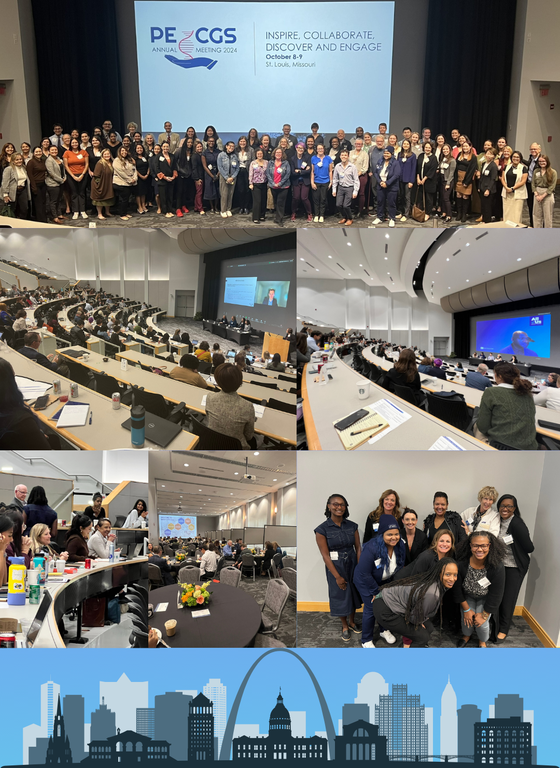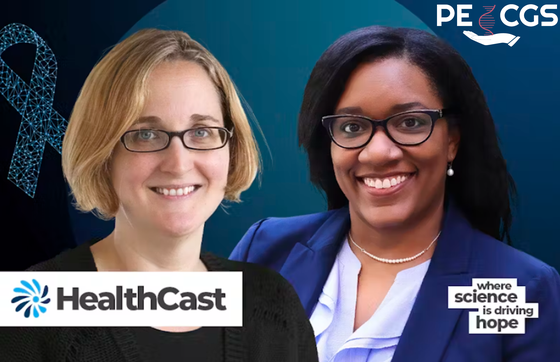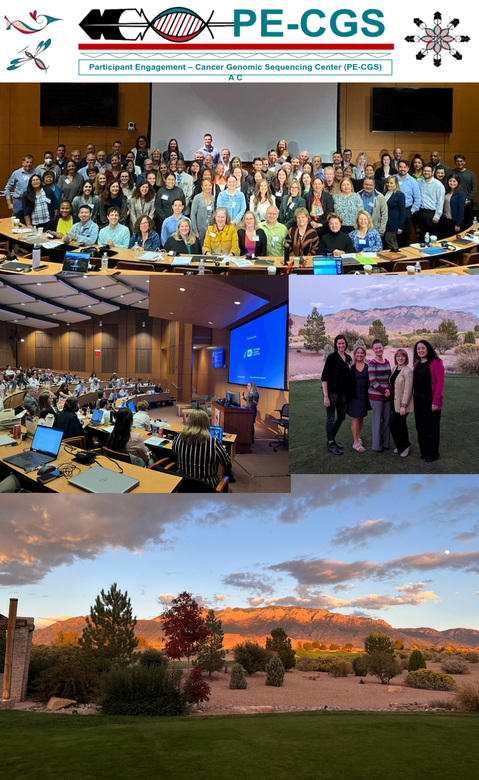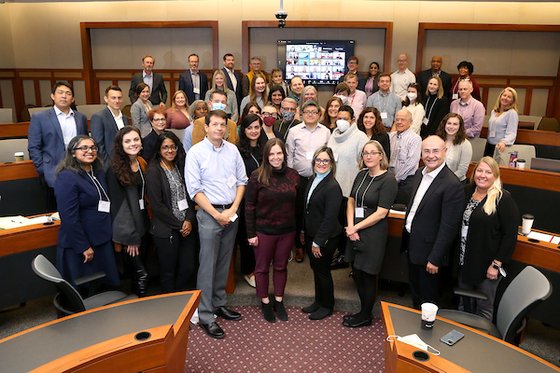News
2024
Featuring Early-Career Investigators
Dr. Fernanda Martins Rodrigues
The Office of Cancer Clinical Proteomics Research at the National Cancer Institute interviewed PE-CGS member, Dr. Fernanda Martins Rodrigues, a post-doctoral research associate at the Washington University School of Medicine, St. Louis. In this sixth installment of the Investigator Q&A series, Dr. Rodrigues discusses her current work, what drove her to pursue a career in proteomics, the critical role of ethics in research, and more

PE-CGS Annual Meeting: Inspire, Collaborate, Discover, and Engage
The 2024 Participant Engagement and Cancer Genome Sequencing (PE-CGS) Network Annual Meeting, hosted by Washington University in St. Louis, showcased the incredible growth and collaborative spirit within the Network, launched under the National Cancer Institute’s (NCI) Cancer Moonshot initiative. The meeting highlighted the powerful partnership between participants and researchers, emphasizing the critical role of gathering participant insights in refining study designs and processes.
Key research presentations and discussions of the meeting included updates on processes to optimize participant engagement, return clear results from both germline and somatic testing to participants, incorporate participant feedback to enhance communication tools, and streamline workflows. Research Centers shared progress on genomic characterization through innovative approaches, with a focus on expanding research to populations with limited genomic data. A major focus was placed on refining the use of population descriptors in genomics, addressing recommendations from the National Academies of Sciences, Engineering, and Medicine (NASEM): Using Population Descriptors in Genetics and Genomics Research. Dynamic lightning talks from junior faculty showcased innovative research bridging the gap between participant engagement and genomics, focusing on topics such as identifying participant motivations, improving genomic knowledge, and exploring mutational signatures in tumors.
The participant panel was a key highlight, illustrating how partnerships between researchers and communities are rebuilding trust in research. Panelists shared personal experiences of mistrust in the medical system but emphasized how the PE-CGS Network’s focus on transparency, respect, and engagement had transformed their experiences, leading to renewed trust and greater involvement in research efforts.
Plenary lectures by Dr. John D. Carpten and Dr. Melissa B. Davis addressed the need for research efforts that consider the social, environmental, physiological, and biological factors influencing cancer outcomes. In addition to the presentations and discussions, the meeting featured a diverse array of research posters, showcasing the depth and breadth of work being conducted across the Network.
Overall, the 2024 PE-CGS Annual Meeting was an engaging and insightful event, showcasing new ideas, progress updates, and fruitful collaborations. It reinforced the value of participant-researcher partnerships and highlighted the significant impact of participant-driven insights, paving the way for continued advancements in cancer research across the Network.

Cancer HealthCast: This Unique Network Closes Research Gaps in Cancer Genomics
The effort engages cancer patients and survivors to advance research aimed at improving cancer care.
The Participant Engagement and Cancer Genome Sequencing (PE-CGS) Network, part of the Cancer Moonshot Initiative, is a collaboration between the National Cancer Institute and research institutions to engage cancer patients directly and ultimately better understand cancer genomics.
One of six funded projects is with Washington University, where researchers are studying molecular changes in tumors for cancers such as cholangiocarcinoma, multiple myeloma, and colorectal cancer in patients under the age of 50. Dr. Bettina Drake, professor at the university’s School of Medicine, discusses her team's efforts to improve genomic insights into these cancers. NCI Program Director Dr. Leah Mechanic also discusses how the PE-CGS Network is advancing precision medicine efforts in cancer care and treatment.
This is an in-depth peek into one of many programs within a broader collaboration effort to better understand cancer and accelerate the Cancer Moonshot’s mission to end cancer as we know it. Learn more and listen to the podcast

2023
PE-CGS Annual Meeting: Inspire, Collaborate, Discover, & Engage
The Network was pleased to host the 2023 Annual Meeting on October 24th-26th at the University of New Mexico Comprehensive Cancer Center.
A key focus of the meeting was on the integral role of participant engagement, with discussions addressing potential challenges and solutions. The meeting explored effective strategies for engaging participants, improving communication of research results, and understanding factors that influence individuals' decisions to participate in genomic research. Attendees discussed ways to systematically address these challenges and develop comprehensive approaches to encourage participation.
The event featured an array of research posters, offering comprehensive overviews of research centers and e-posters showcasing communication and educational materials. Emerging genomic tools took center stage, with discussions centered around their potential to revolutionize cancer care. Special consideration was given to the need for developing ethical frameworks in genomic research, especially when working with populations with limited genomic data, to ensure thoughtful study design and execution.
A dedicated segment of the meeting explored the current state of artificial intelligence (AI) within health research, emphasizing crucial ethical considerations and regulatory input for responsible deployment of AI. The meeting concluded with a discussion on leveraging the size and scope of the PE-CGS Network to address critical research questions in participant engagement and advance the field.
Research Centers had the opportunity to share and discuss their experiences over the past year, including challenges and lessons learned. We were happy to include virtual participants in all of the activities and presentations throughout the meeting.

Engaging People with Low-Grade Glioma in Cancer Research
We are pleased to share that OPTIMUM, a PE-CGS Research Center, was featured on the NCI Cancer Currents Blog. The post highlights OPTIMUM’s mission of improving the care of people with low-grade glioma, their opportunities for people to participate in genomic research, and their current and future projects. Read the full blog post here

OPTIMUM's Annie Heffernan receives Brain Tumor Epidemiology Consortium (BTEC) Junior Investigator Award
OPTIMUM's Annie Heffernan received the Brain Tumor Epidemiology Consortium (BTEC) Junior Investigator Award for OPTIMUM's research on quality of life for their Low Grade Glioma (LGG) Registry. We asked Heffernan a few questions about her background, challenges, and future directions:
- Can you briefly tell us about your background and what led you to pursue research on the long-term quality of life for adults diagnosed with LGG?
"I first became interested in this topic when I was in high school, after my godmother was diagnosed with a brain tumor. Although the tumor was benign, I saw how she was affected immediately following surgery and the time and effort it took for her to feel like herself again and return to her normal life. Once I began working on the International Low Grade Glioma Registry and OPTIMUM Study, I realized that many of the LGG patients I talked to also experience symptoms, impairments, and decreased quality of life (QOL), even years after diagnosis and treatment. While we search for more effective therapies to improve overall and progression-free survival, it’s imperative that we also focus on helping individuals with LGG maintain levels of functioning and QOL similar to before their diagnosis."
- What are some of the challenges faced by persons with LGG and how can these symptoms be better acknowledged and managed?
"LGGs are marked by slow growth, with longer survival compared to other malignant brain tumors, and typically present in young (mean age 41 years), otherwise healthy adults. These tumors are associated with cognitive and physical symptoms related to both natural disease progression as well as treatment. Because persons with LGG are often in the midst of their careers and family responsibilities, common symptoms such as fatigue and problems with sensation, memory, thinking, or speaking can severely limit the ability to participate in their usual activities and thus diminish QOL. Researchers are starting to consider interventions such as physical exercise and cognitive training to help individuals manage symptoms, however additional work needs to be done to make these therapies more widely accessible."
- What are some of the future directions for your research and how might it impact the lives of persons with LGG?
"We hope that by better defining the symptoms and specific aspects of quality of life that are affected in persons with LGG, we can help to inform the development of supportive care and rehabilitative therapies for this population. I am also interested in looking at how quality of life outcomes for LGG patients might be correlated with factors such as diet, exercise, religiousness/spirituality, and social support."
- Is there anything else about you or your research that you would like to share?
"We encourage anyone who has been diagnosed with a WHO Grade 2/3 glioma to participate in our research! The International Low Grade Glioma Registry seeks to better understand the risk factors and outcomes, including quality of life, associated with LGG. Individuals who have had two or more surgeries are eligible for OPTIMUM (OPTimIzing engageMent in discovery of molecular evolution of low grade glioma), a study within the Registry that is focused on how the genetic characteristics of LGG evolve over time and in response to treatment. Enrollment for both studies is simple and can be completed online at app.hugo.health/enroll/LGG. Those interested in learning more about our research can do so at gliomaregistry.org."
'Deciding on My Dimples' - Congratulations on Publication to Liz Salmi
A big congratulations to Liz Salmi on her recent publication in The New England Journal of Medicine. The perspective piece discusses her experience as a patient with grade 2 astrocytoma, including a perspective from the operating room and unlikely familial links.
Liz Salmi is a patient advocate and co-investigator of the OPTIMUM Research Center. Read the article here
2022
PE-CGS Annual Meeting: Partnering Beyond the Science
The Network was pleased to host the 2022 Annual Participant and Investigator Meeting on November 15th and 16th at The Ohio State University. The meeting hosted discussions on the future of the Cancer Moonshot; participant perspectives; insights on the goals and accomplishments of each research center; fostering collaboration in research; and developing shared values for the Network. We were grateful for the presentations by Dr. Dinah Singer from NCI and Dr. Danielle Carnival from the White House Office of Science and Technology Policy.
Research Centers had the opportunity to share and discuss their experiences over the past year, including challenges and lessons learned. We were happy to include virtual participants in all of the activities and presentations throughout the meeting.

